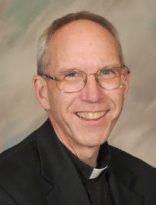Some 500 years before Christ, the Greek philosopher Heraclitus observed: “Panta rhei” — that is, “Everything flows.” In other words, change is a constant experience in life. Today, change is measurably increasing in pace and scope.

Change tends to unsettle us, even if it is positive change to which we look forward. Much of the change we undergo happens in matters beyond our control — the progression of the seasons, the aging of our bodies, the passing of fads, the loss of loved ones. Yet, we are not simply passive observers of change, because we are always free to choose our attitude toward it.
Indeed, one of the defining aspects of human nature is our ability to adapt creatively to the variety of life. Gradually, our sense of identity unfolds by — and persists through — change, helping to shape the colorful and unique personality we each claim as “me.” Even in the face of changes that we would prefer not to happen, we can learn from the words of Jesus before his Passion: “Father, if it is possible, let this cup pass me by; yet not as I will, but as you will” (Matthew 26:39).
As a local Church, and as part of the universal Church, we are entering another phase of change with Area Catholic Communities. We have an opportunity for renewal and fresh beginnings, a time to refocus on the core of our identity as believers in Jesus, sent by the Lord to proclaim the Good News to all the world.
Parish communities have always been formed in a particular place and time with the practical goal of making present and accessible the mystery of the universal Church at the local level. Decisions around this goal are by their nature historically conditioned and thus intended to be responsive to changing needs.
[perfectpullquote align=”right” bordertop=”false” cite=”” link=”” color=”#1a8cff” class=”” size=”16″]“WE ARE NOT SIMPLY PASSIVE OBSERVERS OF CHANGE, BECAUSE WE ARE ALWAYS FREE TO CHOOSE OUR ATTITUDE TOWARD IT.”
[/perfectpullquote]Parish life and identity are important. Like individuals and families, parishes are unique communities with their own characteristics, history and rich mixture of personalities and outlooks — and the one Church does live in them. But made in the image of God, who is a communion of persons, we, too, are called to relationship, rooted in what we hold in common as the source of our unity.
For us, belonging to Christ in the Catholic communion is the core of who we are, members of the living body of Christ. This identity transcends any local boundaries, no matter how broadly drawn. We are united in hearing the same Scriptures, celebrating the same sacraments, professing the same faith, led by the successors of the apostles. We belong to something greater than ourselves — something we did not, and cannot, create for ourselves or direct as we wish. Christ has called us by name into the life of the Church; he has gifted us with the same Spirit; and he continually renews and re-creates this spiritual life within his body.
We do not begin from nothing. We are collaborating among communities deeply rooted in word, sacrament and service. We are simply called to share Catholic life with other members of the same family. To do so well, we accept the opportunity to assess, evaluate and redirect our resources, individually and as communities, to the one mission Jesus gives his people. This will take patience, courage, respect, listening, charity.
A parable of Jesus might guide our reflections: “The kingdom of heaven is like a net thrown into the sea, which collects fish of every kind. When it is full, they haul it ashore and sit down to put what is good into buckets. What is bad, they throw away” (Matthew 13:47-48).
As we look at how our communities and programs have developed, what is of lasting value that ought to be preserved? What might we need to surrender for the time being, good as it may have been in the past, to accommodate the realities of our situation? And what might we wisely discard as of no real use in advancing the mission given to us by Jesus?
Everything flows, Heraclitus saw; one never really steps into the “same” river. Yet he also had the intuition that there must be something that perseveres beneath the myriad of changes that he observed, something that gives order and purpose to the flux of change. He called it “Logos” — we might translate this as “Word.”
As people of faith, we know that “something” is Someone, the Word made flesh in Jesus, who assures us that “heaven and earth will pass away, but my words will not pass.” In him, we look to the future, not with mere passive resignation, but with hope-filled faith and renewed commitment to listen to the Spirit of Christ, sent to lead us into all truth (John 14:26). In this world, everything flows; but Jesus Christ is the same, yesterday, today and forever (Hebrews 13:8).
Father Tom Knoblach is pastor of three parishes in St. Cloud: Holy Spirit, St. Anthony and St. John Cantius.
(Copyright Getty images/Zolnierek)






















